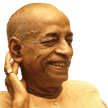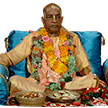Meditation - an essential subject: Difference between revisions
(Created page with "Category:Essential Subjects <!----------------------- edit below this line -----------------------> <!------------------------ begin introduction text below --------------...") |
(Vanibot #0041: Moves Choose Another box to the end) |
||
| Line 2: | Line 2: | ||
<!----------------------- edit below this line -----------------------> | <!----------------------- edit below this line -----------------------> | ||
<!------------------------ begin introduction text below ------------------------> | <!------------------------ begin introduction text below ------------------------> | ||
The process by which we give up our thoughts of material things is called pratyāhāra, which entails being freed from all material thoughts and engagements. The word abhidhyāyet, which is used in this verse, indicates that unless one's mind is fixed, one cannot meditate. The conclusion, therefore, is that meditation means thinking of the Lord within. Whether one comes to that stage by the aṣṭāṅga-yoga system or by the method recommended in the śāstras especially for this present age—to constantly chant the holy name of the Lord—the goal is to meditate on the Supreme Personality of Godhead. | |||
Srila Prabhupada's books, lectures, conversations and letters offer a comprehensive presentation of this essential subject as seen in the Vaniquotes '''[[Vaniquotes:Category:Meditation|Meditation]]''' category. An introduction from his books is given below in the following | Srila Prabhupada's books, lectures, conversations and letters offer a comprehensive presentation of this essential subject as seen in the Vaniquotes '''[[Vaniquotes:Category:Meditation|Meditation]]''' category. An introduction from his books is given below in the following 10 quotes. | ||
<!-------- end introduction text and don't touch next three lines ---------> | <!-------- end introduction text and don't touch next three lines ---------> | ||
== Quotes from Srila Prabhupada's books == | == Quotes from Srila Prabhupada's books == | ||
<!----------------- edit quote boxes below this line -----------------> | <!----------------- edit quote boxes below this line -----------------> | ||
{{VaniQuotebox| | {{VaniQuotebox|A devotee is always anxious to see that his time is not wasted in anything which is not connected with Krsna. Consequently he does not like the benefits derived from fruitive activity, yogic meditation or the cultivation of knowledge|A devotee is always anxious to see that his time is not wasted in anything which is not connected with Kṛṣṇa. Consequently he does not like the benefits derived from fruitive activity, yogic meditation or the cultivation of knowledge. He is simply attached to words favorably related to Kṛṣṇa. Such pure devotees of the Supreme Lord always pray to Him with tears in their eyes, their minds always recollect His activities, and their bodies always offer Him obeisances. Thus they are satisfied. Any devotee who renders such devotional service dedicates his life and body for the purpose of the Lord. '''(Teachings of Lord Caitanya, Chapter 13)'''}} | ||
{{VaniQuotebox| | {{VaniQuotebox|A Krsna conscious person gradually elevates himself without endeavoring for this so-called silent meditation. Simply because he is engaged in Krsna consciousness he automatically gives up all this nonsense and develops a high character|A Kṛṣṇa conscious person gradually elevates himself without endeavoring for this so-called silent meditation. Simply because he is engaged in Kṛṣṇa consciousness he automatically gives up all this nonsense and develops a high character. One develops the highest character by becoming a pure devotee of Kṛṣṇa. The conclusion is that no one can truly have any good qualities if he is lacking Kṛṣṇa consciousness. '''(Nectar of Devotion, Chapter 1)'''}} | ||
{{VaniQuotebox| | {{VaniQuotebox|A yogi who is practicing meditation on the Supersoul sees within himself the plenary portion of Krsna as Visnu - with four hands, holding conchshell, wheel, club and lotus flower|A yogī who is practicing meditation on the Supersoul sees within himself the plenary portion of Kṛṣṇa as Viṣṇu—with four hands, holding conchshell, wheel, club and lotus flower. The yogī should know that Viṣṇu is not different from Kṛṣṇa. Kṛṣṇa in this form of Supersoul is situated in everyone's heart. Furthermore, there is no difference between the innumerable Supersouls present in the innumerable hearts of living entities. '''(Bhagavad-gītā 6.31)'''}} | ||
{{VaniQuotebox| | {{VaniQuotebox|All good work, culture of knowledge, meditation, austerity, and so forth - whatever is performed - all of these activities are meant to ameliorate this material disease|The karma-yogī knows very well that Śrī Kṛṣṇa, the Personality of Godhead, is the enjoyer of everything, and that He is the Lord of all living entities. He sees very little value in the false prestige by which all living entities in this material world put themselves in the position of either an enjoyer or a renouncer. The learned sages feel disgust with this sort of false prestige as the quintessential disease of material existence. All good work, culture of knowledge, meditation, austerity, and so forth—whatever is performed—all of these activities are meant to ameliorate this material disease. '''(Message of Godhead, Chapter 2)'''}} | ||
{{VaniQuotebox| | {{VaniQuotebox|Although the rituals of religion are confidential, meditation and cultivation of knowledge are still more confidential. And surrender unto Krsna in devotional service in full Krsna consciousness is the most confidential instruction|From Bhagavad-gītā we can understand that to realize oneself by philosophical speculation and by meditation is one process, but to fully surrender unto Kṛṣṇa is the highest perfection. This is the essence of the teachings of Bhagavad-gītā. The path of regulative principles according to the orders of social life and according to the different courses of religion may be a confidential path of knowledge. But although the rituals of religion are confidential, meditation and cultivation of knowledge are still more confidential. And surrender unto Kṛṣṇa in devotional service in full Kṛṣṇa consciousness is the most confidential instruction. '''(Bhagavad-gītā 18.78)'''}} | ||
{{VaniQuotebox| | {{VaniQuotebox|Although the yogis sit in meditation upon Lord Visnu, who is residing in Vaikuntha, a devotee of Krsna is so proud that he does not consider such meditation to be very valuable. This feeling of pride is due to one's having achieved the highest goal|Although the yogīs and great sages sit in meditation upon Lord Viṣṇu, who is residing in Vaikuṇṭha, a devotee of Kṛṣṇa is so proud that he does not consider such meditation to be very valuable. This feeling of pride is due to one's having achieved the highest goal of life—Kṛṣṇa. '''(Nectar of Devotion, Chapter 29)'''}} | ||
{{VaniQuotebox| | {{VaniQuotebox|Krsna alone enjoys the result of all sacrificial performances. The sacrifices of the ordinary workers and the meditation and austerities of the empiric philosophers are all ordained and maintained by the Personality of Godhead|Śrī Kṛṣṇa is the Supreme Personality, who alone is capable of enjoying the result of all sacrificial performances. The sacrifices of the ordinary workers and the meditation and austerities of the empiric philosophers are all ordained and maintained by the Personality of Godhead, Śrī Kṛṣṇa. In turn, the Supersoul—the localized aspect of Viṣṇu, which is the object of meditation for the mystics—is a plenary portion of Śrī Kṛṣṇa, the Personality of Godhead. '''(Message of Godhead, Chapter 2)'''}} | ||
{{VaniQuotebox| | {{VaniQuotebox|In the material world the activities of the mind are acceptance and rejection. As long as the mind is in material consciousness, it must be forcibly trained to accept meditation on the Supreme Personality of Godhead|In the material world the activities of the mind are acceptance and rejection. As long as the mind is in material consciousness, it must be forcibly trained to accept meditation on the Supreme Personality of Godhead, but when one is actually elevated to loving the Supreme Lord, the mind is automatically absorbed in thought of the Lord. In such a position a yogī has no other thought than to serve the Lord. This dovetailing of the mind with the desires of the Supreme Personality of Godhead is called nirvāṇa, or making the mind one with the Supreme Lord. '''(Śrīmad-Bhāgavatam 3.28.35)'''}} | ||
{{VaniQuotebox|In the Bhagavad-gita it is clearly stated that to meditate upon the impersonal feature of the Supreme is very difficult. It is practically no meditation or simply a waste of time because very seldom is the desired result obtained|In the Bhagavad-gītā (12.5) it is clearly stated that to meditate upon the impersonal feature of the Supreme is very difficult. It is practically no meditation or simply a waste of time because very seldom is the desired result obtained. The devotees, however, meditate upon the Lord's factual form and pastimes, and therefore the Lord is easily approachable by the devotees. This is also stated in the Bhagavad-gītā (12.9). The Lord is nondifferent from His transcendental activities. '''(Śrīmad-Bhāgavatam 1.9.41)'''}} | |||
{{VaniQuotebox|The Lord has innumerable forms, and He appears in a particular form as preferred by a particular type of devotee. A yogi is advised to meditate upon the forms that are approved by devotees. A yogi cannot imagine a form for meditation|The Lord has innumerable forms, and He appears in a particular form as preferred by a particular type of devotee. A yogī is advised to meditate upon the forms that are approved by devotees. A yogī cannot imagine a form for meditation. Those so-called yogīs who manufacture a circle or target are engaged in nonsense. Actually, a yogī must meditate upon the form of the Supreme Personality of Godhead that has been experienced by the Lord's pure devotees. '''(Śrīmad-Bhāgavatam 3.28.29)'''}} | |||
<!----------------- edit quote boxes above this line -----------------> | <!----------------- edit quote boxes above this line -----------------> | ||
| Line 30: | Line 34: | ||
'''Meditation- [[Vaniquotes:Category:Meditation|explore more within this category]]'''. | '''Meditation- [[Vaniquotes:Category:Meditation|explore more within this category]]'''. | ||
{{EsentialSubjectTotal}} | {{EsentialSubjectTotal}} | ||
<div style="float:left;"> | |||
{{EssentialSubjectnav}} | |||
</div> | |||
__NOTOC__ | __NOTOC__ | ||
__NOEDITSECTION__ | __NOEDITSECTION__ | ||
Latest revision as of 16:55, 22 November 2020
The process by which we give up our thoughts of material things is called pratyāhāra, which entails being freed from all material thoughts and engagements. The word abhidhyāyet, which is used in this verse, indicates that unless one's mind is fixed, one cannot meditate. The conclusion, therefore, is that meditation means thinking of the Lord within. Whether one comes to that stage by the aṣṭāṅga-yoga system or by the method recommended in the śāstras especially for this present age—to constantly chant the holy name of the Lord—the goal is to meditate on the Supreme Personality of Godhead.
Srila Prabhupada's books, lectures, conversations and letters offer a comprehensive presentation of this essential subject as seen in the Vaniquotes Meditation category. An introduction from his books is given below in the following 10 quotes.
Quotes from Srila Prabhupada's books
Meditation- explore more within this category.
Vanipedia has now over 903 introductory articles compiled from Srila Prabhupada's books under the series titled Essential Subjects. All these articles can be seen in the Table of Content on the right side of this article and also here in this Umbrella Category. Browse through them to relish the breadth and depth of Srila Prabhupada's teachings - There is a subject for everyone.









